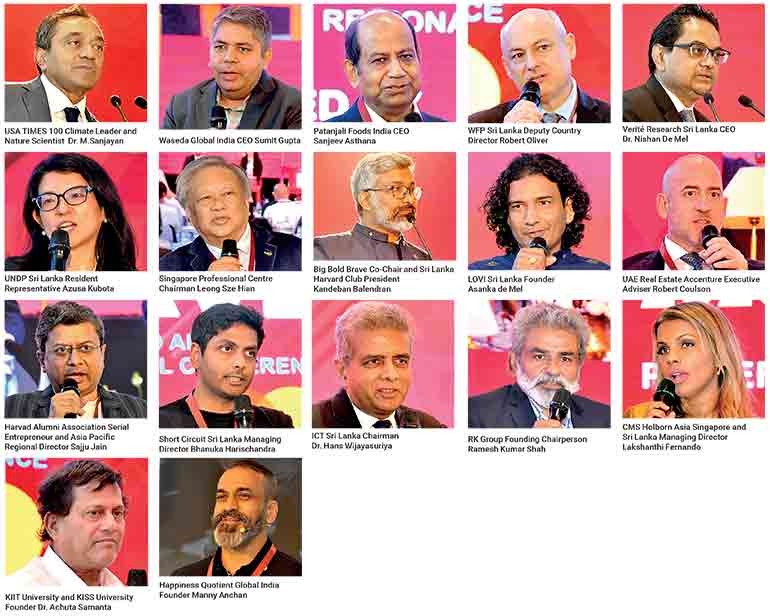Tuesday Feb 17, 2026
Tuesday Feb 17, 2026
Thursday, 20 November 2025 02:44 - - {{hitsCtrl.values.hits}}
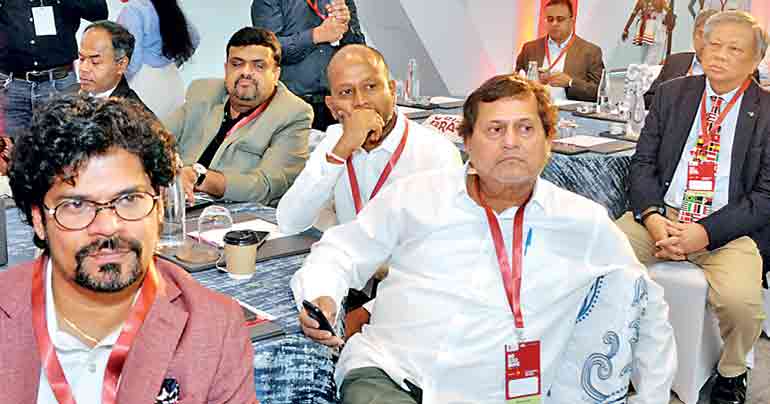
By Divya Thotawatte
The ‘Big Bold Brave 2025’ (BBB 2025), a transformative platform spotlighting opportunities in the fast-emerging Asia-Pacific (APAC) region, concluded recently in Colombo, gathering renowned industry leaders from across the world for future-focused dialogue.
Organised by the Harvard Club of Sri Lanka, BBB 2025 was held 12-14 November at Cinnamon Life – City of Dreams, Colombo.
The three-day event began with an exclusive welcome event on 12 November, with the main conference the following day bringing together leaders and delegates from over 15 countries in the region.
The summit featured recognised leaders in business, government, academia, NGOs, and Harvard Alumni who spoke on core challenges and opportunities that will transform the region within the next 25 years. The event included a remarkable lineup of keynotes, panels, case studies, and workshops, helping participants explore opportunities in five topics areas: Education, human capital development, and jobs of the future; Technology, digital economy, and entrepreneurship; Modernising agriculture and food security; Energy infrastructure development and Environment, sustainability, and climate change adaptation.
Setting the tone for the summit’s discussions, day one of the conference opened with a keynote by nature scientist, conservation leader, and Time100 Climate Leader Dr. M Sanjayan who explored how preserving nature was of key economic interest.
Embracing nature as economic strategy
“We stopped treating nature as our planet’s infrastructure. We started treating it as an excess at best and hostile at worst. The cost of that decision is not actually environmental. The cost is economic. It’s national.” Countries that understand nature as economic infrastructure would therefore be the ones to win the future.
Sanjayan said that for the first time in human history, the development and transformations taking place right now were faster than their values, ethics, and nature’s ability to replenish itself. He explained that in this context, humans had severed their bond with nature, and in doing so, built economies on top of the very systems that sustain them.
“When nature’s infrastructure fails, economies don’t just shake, they can actually break.” He illustrated the point with a few global examples. In Maldives, coral reefs were the foundation of the economy, with a 20% contribution to GDP through tourism, which was based entirely on the reef system. Another 20% was from fisheries.
One of his most striking examples was Amazon, which highlights how environmental degradation can result in economic paradoxes. Deforestation there emits as much carbon per person as Qatar (about 33 tons per capita), yet average income was below $ 5,000.
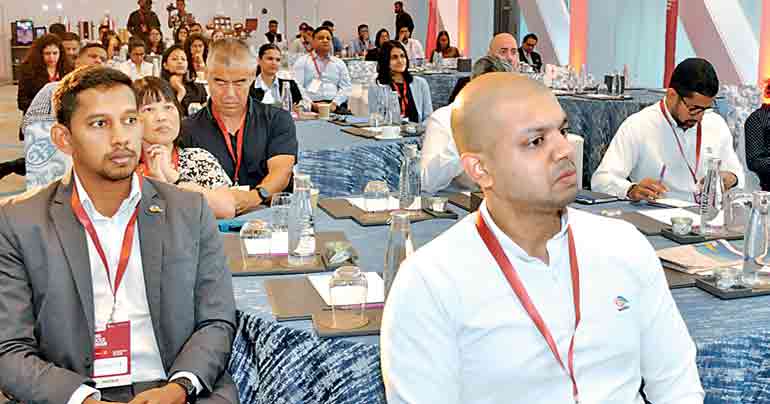
“There’s no other region that emits so much and has produced so little wealth for its people.” By contrast, the Amazon’s intact ecosystem performs ‘$ 3 trillion worth of work’ each year in climate regulation, rainfall generation, and carbon generation, a value that is greater than Apple or Amazon, the company,” Sanjayan noted.
Sanjayan stressed that the next phase of global growth would therefore come from restoring, not exploiting nature. “Protecting nature now is a profitable activity. It’s not just symbolic.”
He pointed to the economic /financial tools emerging today such as debt-for-nature swaps, blue and green bonds, carbon markets, and reef insurance. There was potential to go even further, he added. “You can get into more speculative things like crypto or stablecoins, where you create a coin that is backed by a natural asset– like hydro or of a country’s forest.”
Sri Lanka was well-placed to lead this shift with its immense ecological diversity and compact geography, Sanjayan pointed out. In some ways, the country was already ahead of the curve, with a visible absence of plastic in Sri Lanka’s beaches being a “remarkable thing in Asia”.
“We have a massive amount of natural capital all tucked into a small geography, from water to forests to fisheries. And we still have cultural memory still alive within us… that reverence of nature in our religions and cultural practices,” he noted.
Building on this vision of nature as infrastructure, Asia’s food systems highlight a critical intersection of environment and economy. Just as economic stability increasingly required a more focused strategy on nature conservation, experts at BBB 2025 highlighted that the region must go beyond simply producing enough calories to ensure nutrition, affordability, and resilience in the face of shocks.
Food Security to nutritional security
As the world transforms with technology and Asia overcomes its former challenges, the region must look deeper into the challenges affecting its people and the countries’ stability. ‘Feeding 3 in 5 in the world,’ a discussion on food security and innovation in Asia featured a panel of experts who argued that Asia must move beyond merely feeding its people to nourishing them sustainably.
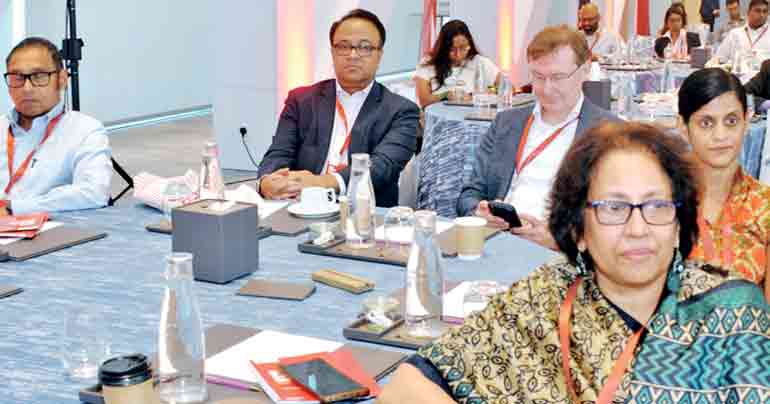
Linking nutrition directly to economic growth, Waseda Global India CEO Sumit Gupta highlighted that protein consumption per capita mirrored income levels and human development. “More people now die of obesity than hunger,” he said, stressing the need to focus on what people eat, and not just how much.
Patanjali Foods India CEO Sanjeev Asthana also highlighted how hunger was evolving: “You may be driving a car, but still be hungry.” He pointed to a widening gap between food availability and access to affordable, nutritious diets, underlining how hunger was no longer defined by starvation, but also malnutrition and the lack of nutritional diversity.
For India and much of Asia, the fixation on food grains like rice and wheat had overshadowed nutrition and quality of life. The policy challenge, then, was not just about producing food, but also affordability and a focus shift to nutrition, Asthana said.
According to World Food Programme (WFP) Sri Lanka Deputy Country Director Robert Oliver, the most pressing threat is inflation. Commodity prices have seen a sharp surge since the pandemic, leaving the poorest households vulnerable. While 2024 WFP data showed progress where food insecurity in Sri Lanka has dropped from 24% to 16%, Oliver said the most at-risk communities still “don’t have a voice.” He called for stronger shock-responsive social protection systems (safety nets that deliver cash or food when crises hit).
The discussion was moderated by United Nations Development Programme (UNDP) Sri Lanka Business and Digital Strategy Consultant Sarani Jayawardene.
As the discussion on food security highlighted the urgent need for resilience and the need for transformation at the local level, a different panel widened the lens to explore how global economic systems, trade, and sustainability intersected in shaping development outcomes.
Rethinking development and global responsibility
Opening the panel ‘It’s a funny world – but no laughing matter’ on the global economic outlook, trade, and sustainable development, Verité Research Sri Lanka CEO Dr. Nishan De Mel pointed out the “ironies of the world we live in,” where humanity has unlocked the mysteries of space and nanoparticles, but still failed to curb carbon emissions or prevent starvation and conflict.
He urged that economics should return to its core purpose of “fostering human flourishing”, praising Asia’s steady journey and success of lifting millions out of poverty through sustained development and relative peace. “You will think that the biggest problems of the global economy are the two T’s: Trump and tariffs. The truth is these are sideshows, the much larger risks are poverty, pollution, and peace, which disrupts so much of the possibilities of our world.”
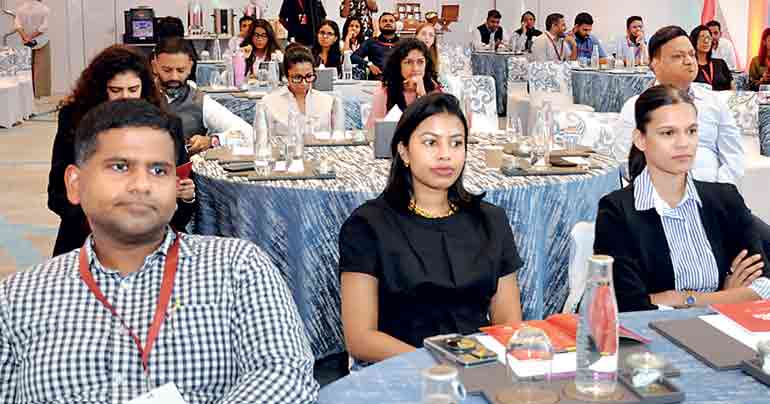
UNDP Sri Lanka Resident Representative Azusa Kubota expanded on those global challenges, noting that “90% of the measurable SDG indicators are off track” less than five years before 2030. However, from debt-for-nature and debt-for-energy swaps to SDG aligned bonds, there was still opportunity in financial innovation to redirect resources from debt servicing to sustainable investment. “This is really a moment in history where we have to rethink education, skills, and financing,” she said, warning that inequality in South Asia was now among the world’s highest.
In contrast to the previously mentioned challenges, Singapore Professional Centre Chairman Leong Sze Hian offered a success story. Outlining the ‘Singapore model,’ he highlighted how responsible financial governance and shared responsibility between the citizens and the state enabled strong public housing, healthcare, and pension systems, which were all self-financed and sustainable. “From a cash flow perspective, the inflows exceeds the outflows every year.”
This panel was moderated by The Examiner CEO and economist Daniel Alphonsus.
More discussion and activities at BBB 2025
Day one of the conference also featured a panel discussion ‘Human Capital in South Asia’ with speakers including Critavo UAE CEO Andy Palanasamy, KIIT University and KISS University Odisha India Vice President Dwiti Wickramaadithya, and MAGNA Education Founder and Colosseum Group Chairman Shailendra Tipparaju, Harvard Business School India Research Center Researcher Kairavi Dey, and Harvard Club of Sri Lanka Founder Kandeban Balendran.
‘Finding Common Ground’, a panel discussion on leadership for economic growth and regional cooperation in the Asia Pacific featured Ceylon Chamber of Commerce Deputy Chairperson and Hirdaramani Group Chairperson Vinod Hirdaramani, TERN Group UAE Founder and CEO Avinav Nigam, AFIG FUNDS UAE Senior Advisor Arjette van den Berg, and LOVI Sri Lanka Founder Asanka de Mel.
Accenture UAE Executive Adviser for Real Estate Robert Coulson, Harvard Alumni Association Asia Pacific Regional Director and serial entrepreneur Sajju Jain, Short Circuit Sri Lanka Managing Director Bhanuka Harischandra, and UAE Special Envoy for Business and Philanthropy Strategic Partnerships Vice President Nishant Singh engaged in a discussion themed ‘AI: the biggest leap in human history,’ exploring the necessity to prepare for a transformed future.
A panel on ‘Digitalisation for rapid growth and global security’ explored navigating privacy and ethics in a connected world. It featured ICT Agency of Sri Lanka Chairman Dr. Hans Wijayasuriya, RK Group India Founding Chairperson Ramesh Kumar Shah, CMS Holborn Asia Singapore and Sri Lanka Managing Director Lakshanthi Fernando, and Precisely India Head and Vice President of Professional Services Sooraj Mundayat.
KIIT University and KISS University Odisha India Founder Dr. Achuta Samanta also shared his journey and strategy in establishing the two institutions in what was then one of India’s poorest states. This case study themed ‘Building India as an education hub’ explored how to massively scale up educational resources, and was moderated by Assiduus UAE Founder and CEO Somdutta Singh.
Other sessions of the first day included one by Happiness Quotient Global India Founder Manny Anchan, who led a session on identifying and prioritising key areas of improvement to enhance overall wellbeing and thrive.
The event was powered by Mastercard while Daily FT was the official print media partner.
Pix by Lasantha Kumara
